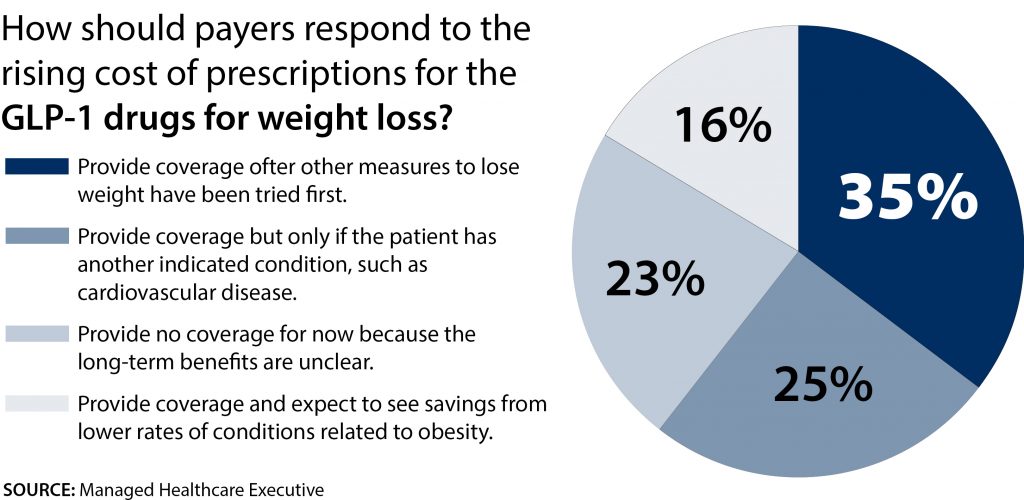While most health plans do not currently cover obesity medications like Wegovy and Zepbound – and MedBen Rx recommends clients continue not to do so – constant media coverage means the calls to do so will only grow. Therefore, employers are increasingly considering their options.
In a recent Managed Healthcare Executive pharmacy survey, plan sponsors, providers and others were asked, “How should payers respond to the rising cost of prescriptions for the GLP-1 drugs for weight loss?” Most replied that such drugs should be covered only after other options have been tried first.
Likewise, Benefits Magazine examined how employers are currently handling the demand for high-cost weight loss drugs. While the majority (62%) don’t provide coverage, others are taking or considering a range of actions, from prior authorization to covering the drugs only for members with certain BMIs.
There have even been suggestions that plan sponsors consider implementing lifetime maximums on obesity drugs. However, doing this jeopardizes a plan’s compliance with the Affordable Care Act (ACA), cautions Caroline Fraker, MedBen’s President, COO & CPO.
“The ACA prohibits lifetime maximums on all essential health benefits, including prescription drugs. To date, there has been no definitive list of which prescriptions are deemed essential benefits and which are not. So from a compliance perspective, MedBen can’t recommend adding financial limitations to obesity drugs,” Fraker said.
In a clear attempt to make the price tag of GLP-1 drugs more palatable, drugmakers are promoting their other health advantages. For example, the Food and Drug Administration recently approved Novo Nordisk’s application to add cardiovascular benefits to Wegovy’s label.
A 2023 SELECT trial determined that patients with pre-existing cardiovascular disease who used Wegovy over 39.8 months experienced the following events, compared to patients given a placebo. As you can see, there is an improvement; however, the same reduction in cardiovascular deaths versus a placebo could be achieved at a lower cost through alternate therapies.
- Cardiovascular death: 2.5% (Wegovy) vs 3.0% (placebo)
- Heart failure composite: 3.4% vs 4.1%
- All-cause death: 4.3% vs 5.2%
A related study determined that 100 people with obesity would need to be treated for three years to prevent one major cardiovascular event.
Which brings up the inevitable question: Do the overall health benefits of these medications justify their inflated cost? The Institute for Clinical and Economic Review (ICER) found that the lifetime employer cost for Wegovy would be $274,400, while the medical costs averted over a lifetime would be $61,600. Suffice it to say, the current return on investment isn’t too great… and moreover, new research finds that bariatric surgery offers longer-lasting weight loss at a substantially lower long-term cost.
Again, based on their cost and unknown long-term effects, MedBen Rx does not recommend covering obesity drugs at this time… but if you are thinking of covering them, we will work with you to examine potential options and implement a strategy that addresses employee needs.


